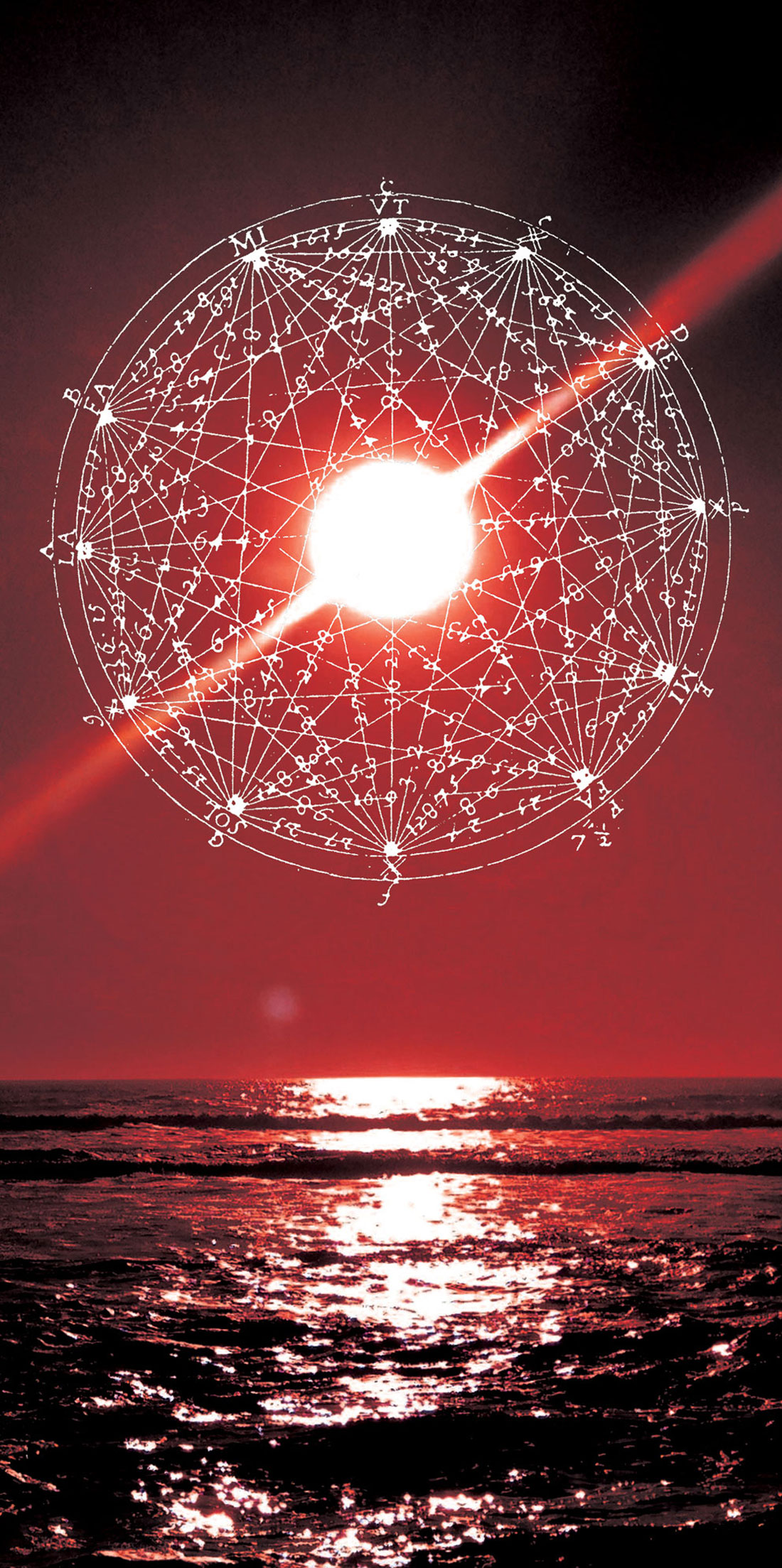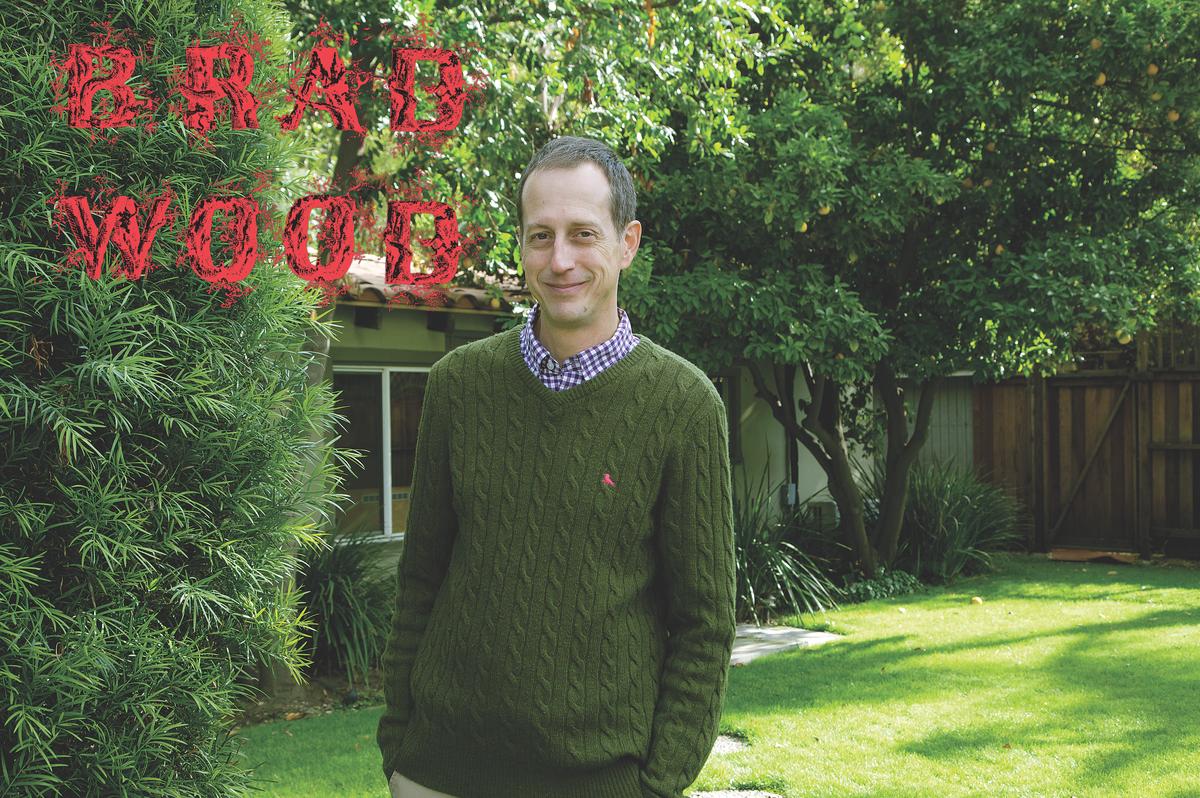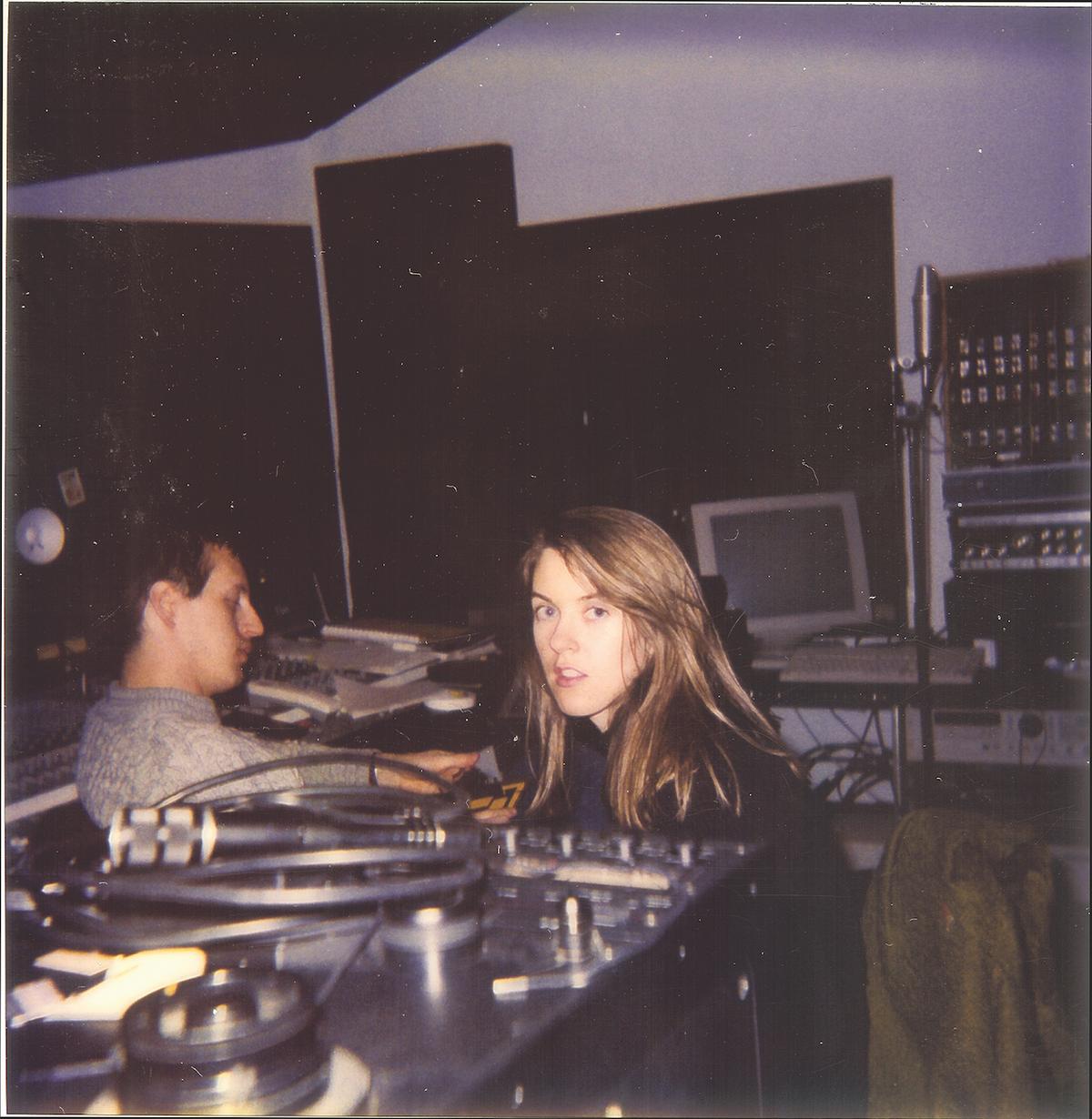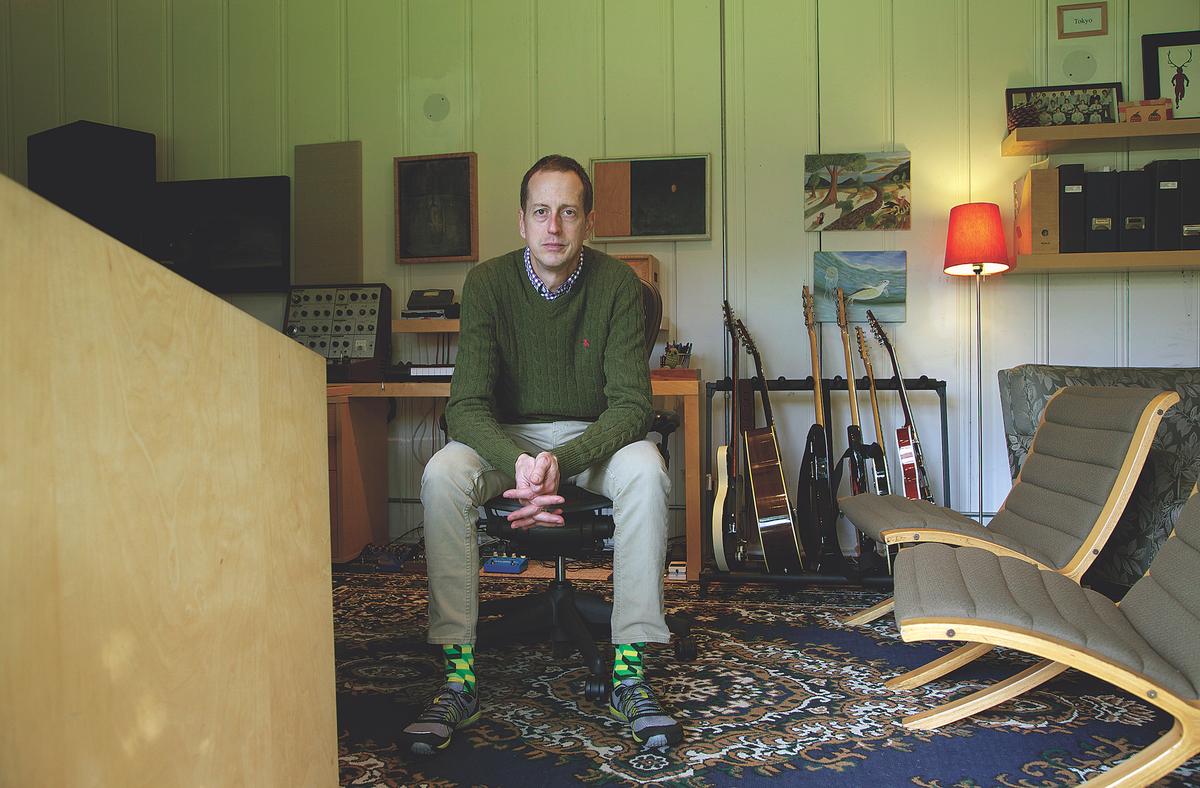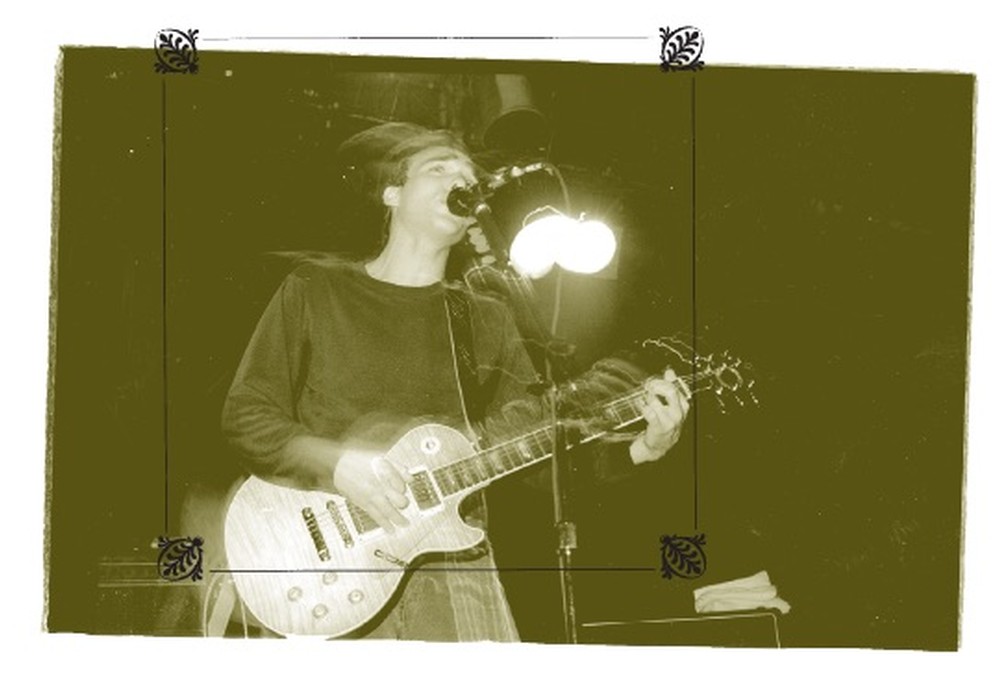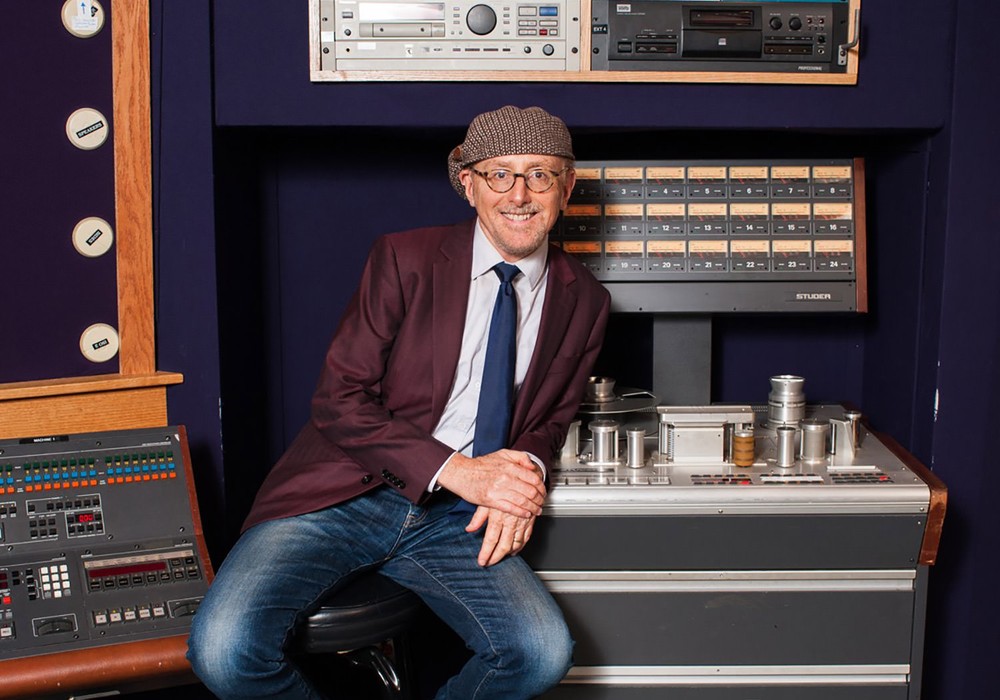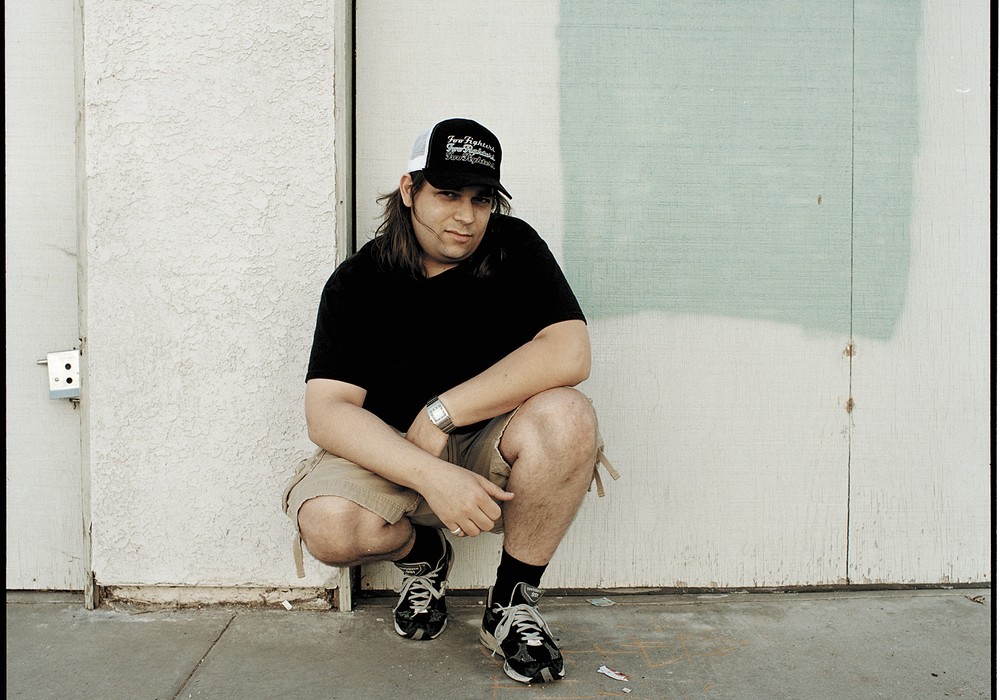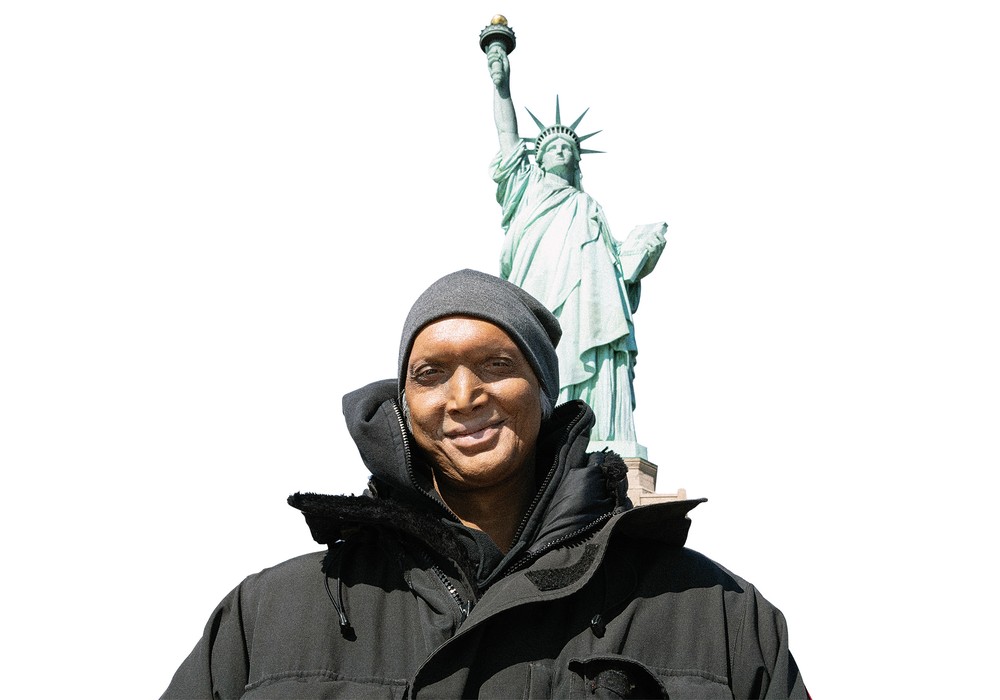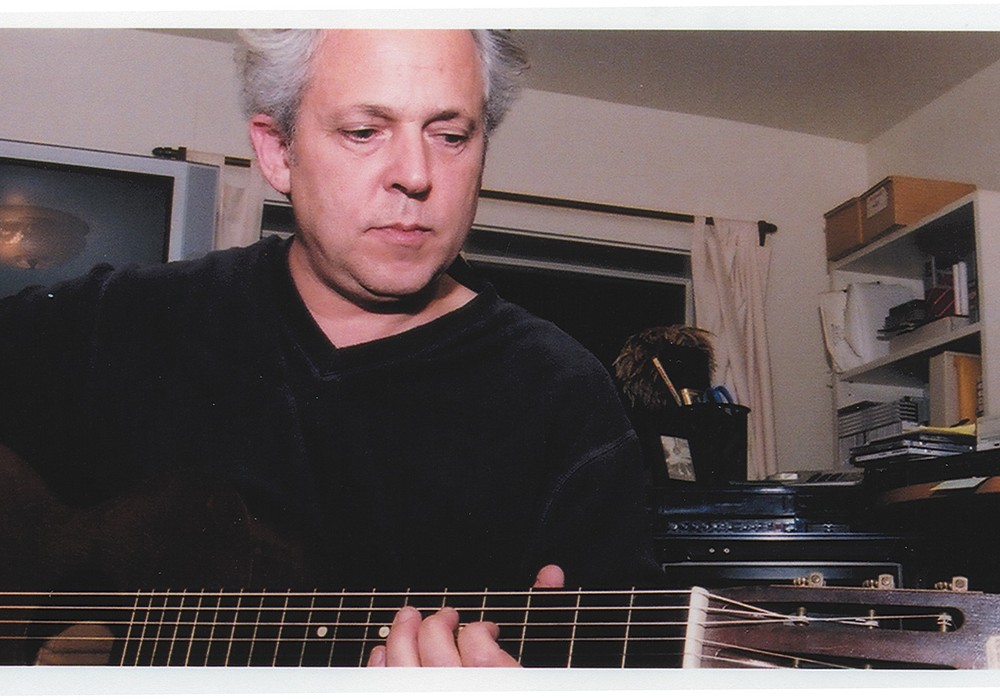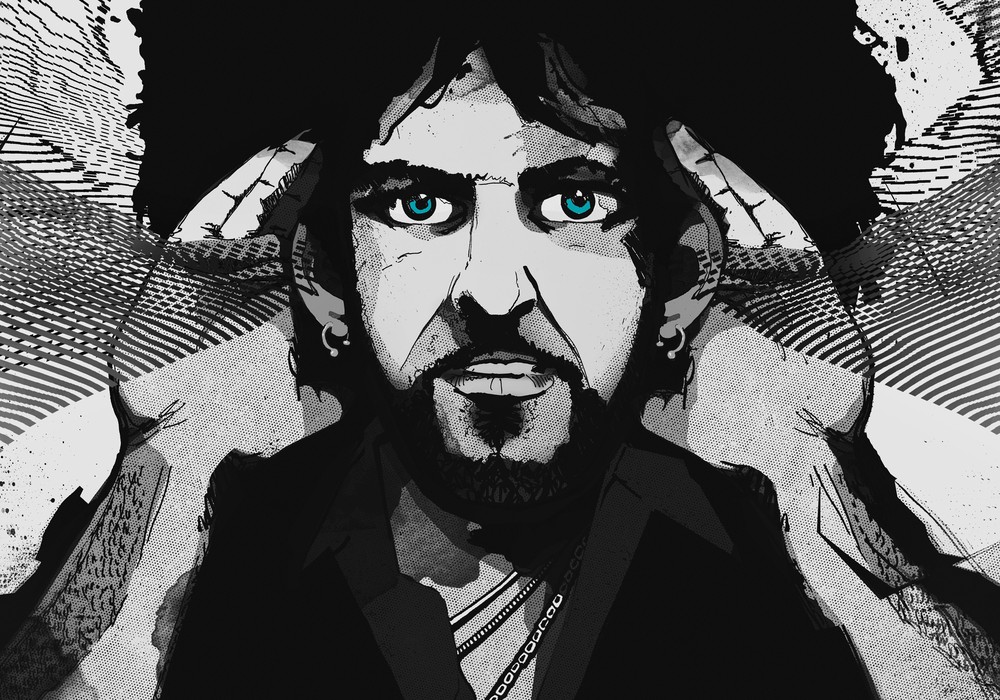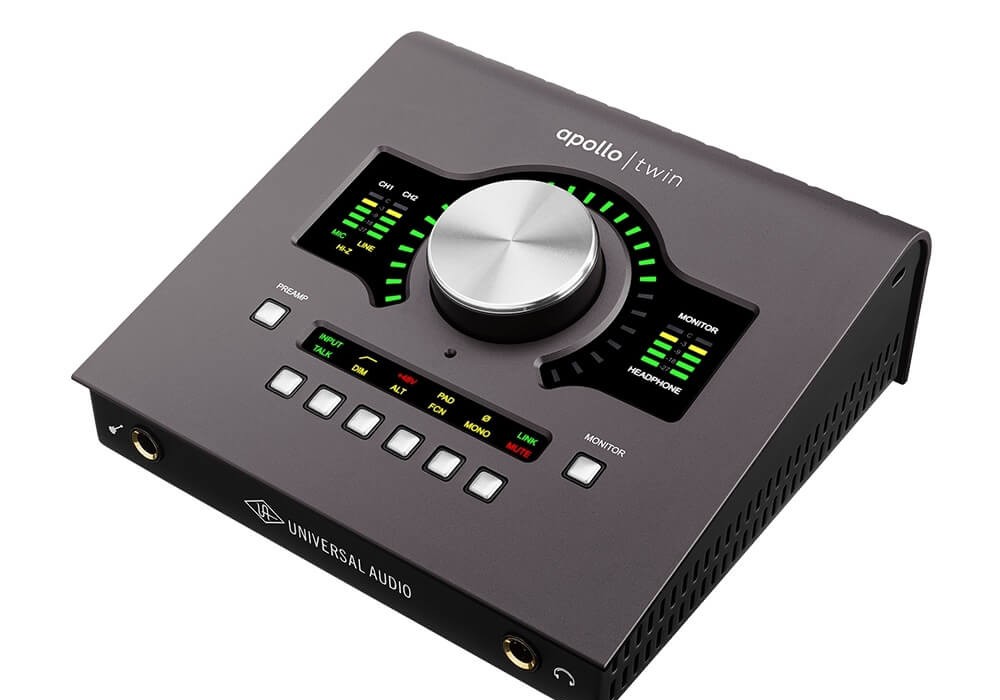What led to being a studio guy?
The dream of being a musician, and specifically a saxophone player, started when I won a talent competition in fifth grade. Later I got a performance scholarship to NIU [Northern Illinois University] to play saxophone. In my freshman year I realized that I was not that good of a saxophone player, compared to the other students. Those guys just had more innate talent, or they put more time into it. Brian Deck [Tape Op #36] and I were friends and roommates in college from our freshman year on, and we both thought we'd move to Chicago and try to find jobs in the music industry. Getting jobs at a recording studio seemed like a way to have a job in the music industry, while still using the skills he and I had accumulated and paid for as college students. It soon became apparent that he and I both had the temperament to be record producers and engineers. It's almost 30 years later, and we're both still doing it. In 1984 my band set upon the idea of building a recording studio. I wasn't really driving the bus, but the older guys had the idea. One of them had bought a house, and we decided to put the next chunk of money into building a recording studio. I didn't have much to do with the gear selection — I didn't have the expertise. We built a really nice basement studio that we then spent the rest of our time working in as a band. We'd rehearse, record, and track stuff. We all learned tons in there. A year or two later I moved to Chicago and got a job at Chicago Recording Company. Then, within a year, Brian and I were building Idful.
What kind of work were you doing initially at CRC?
I was a runner. But I was the best damn runner.
Like you'd double-check the bag of burgers before you dropped them off?
Oh, yeah; I'd make sure. You can't get it wrong. Then I was king of the dub room in the basement of CRC. People would run down and say, "I need 15 cassettes and two 1/4-inch reels, heads-out." There were all these different engineers at CRC, working mostly on voiceovers. I would get three or four different engineers' reels that I needed to make cassettes of. Eventually I was assisting, but not too much. It was mostly on commercial sessions. Brian Deck also worked there. He quit, and we'd already begun plans to start our studio, Idful. I worked for as long as I could until they found out about it, and then they strongly encouraged me to leave.
Competition?
Yeah, it was just un-cool to stay. And I needed to spend more time actually building the damn place, so I quit.
What was the impetus to build a studio in 1988?
At that time in Chicago commercials were the main industry, and most of the best recording studios catered to commercial recordings and/or voiceovers for good reason... it was really great money. The hourly rate was sky-high compared to what you could charge for a comparable album session, with the exception of a big band like Styx or Ministry. There wasn't a lot of music being recorded at these big studios in Chicago. Brian and I both had a hell of a time just getting bands to book in from 7 p.m. until 2 a.m., Monday through Friday. And then we'd have to make the studio look and smell like it had never been used! Even then it was a $65 an hour off-hours rate — still more money than I could ever talk any band into spending. So [we brought in] a third person, Dan Sonis. He was a friend of Brian's and was in a band with him. He had a bit of money and listened to Brian's sob story about trying to make it as a record producer or engineer. He was really generous and said, "I've got some money and some equipment. Let's build a recording studio."
That must have been an adventure.
The three of us had never done any construction whatsoever, and we built it from the ground up in the corner of a former grocery store. We had a lease for a couple hundred dollars a month. We didn't know how to frame a wall! I think we literally made every mistake that you could make, and we even invented new mistakes to make. It took us a year to build the place, but it should've taken six months. We had moments where the three of us would be in tears, because we were out of money and time, and we were really frustrated. When we got to the end of it, we had a big opening party. Steve Albini [Tape Op #10, 87] and bands I'd met came by, and we had all this free beer and food. It was a great time and we got some bookings out of it! The very first thing I ever recorded was a single for this band Tar called "Antlers" which came out on Amphetamine Reptile [Records]. Then Brian started the Shrimp Boat record [Speckly] that I ended up overdubbing and mixing. That was the first full album I ever recorded. I started playing drums with Shrimp Boat. It was the CMJ album of the year that same year. That was my career, from then on! We were booked, sometimes a year and a half in advance.
You're kidding!
I'm not kidding at all.
What year did Idful open?
It technically opened in '89. We started recording in late '88.
I can't believe you had the place booked out for over a year in advance.
Oh yeah, we would. We had people like Corndolly call from Seattle and say, "We're going to be touring this summer." It would be December, because they'd be writing during the winter. We had a band would tell us that they wanted to do demos for their next album in October, but they'd be calling in December of the previous year! This was all as a single control room studio, so Brian and I would have to gingerly work around each other.
I wish it were that way now!
Yeah, projects take longer. We used to do an album in three or four days. I remember when I made an album for Seam [The Problem with Me] on Touch & Go, and we had enough money to book 11 days, right around Christmas and New Year's Eve. After nine days we had completely finished the album. We were sitting in the control room and couldn't believe the luxurious pace we were taking. I almost felt guilty, because I'd never spent nine days on a record! We were like, "What do you want to do?" They just noodled around. Sooyoung Park had his delay pedal and guitar going. They worked up, recorded, and wrote a song that ended up on the album.
I think that some of our readers who are younger might have a hard time grasping why this was all working. I started going into studios as a musician in '85, and there weren't many choices for recording studios that independent bands could afford.
Absolutely. Most cities had very few options. Aesthetically it was a crapshoot, for sure. I think that our generation of recording engineers and producers are really different than the ones that came before us. When I mentioned how I got started, it was almost out of anger, and almost as a dare, because Brian and I were both really disappointed with the sound of a lot of the records that we were buying in the '80s. For example, a band would be really great on Twin/Tone Records, working with Steve Fjelstad and making these amazing records. Then the band would sign to a major label, and immediately their sound would just go into the shitter. Early on I started noticing, "Why do all of the U2 records sound amazing? Why does every Public Image Ltd record sound amazing? Why does Never Mind the Bollocks kick ass? Why do The Bangles sound so weird on record and then when you see them live, they come across as this heavier rock band? Where's all the muscle?" I think that British producers were aesthetically doing more of what I thought they should be doing, but it's just a matter of taste. I didn't like the tastes of most early-to-mid- '80s American record production. The best-sounding stuff was coming from England. Just the fact that they had so much West Indian and Caribbean culture everywhere, you were hearing a lot more dub sounds and adventurous use of effects. We had the time to monkey around and play with the guinea pig bands who were so nice to let us do that. We wouldn't stop until it sounded as good as the records that we were shooting for. I think that showed right away. That also meant mic'ing each other playing drums, testing placements on microphones, testing compressors, testing mic preamps, figuring out how things are supposed to work, and writing all of these things down! I still have pages of notes of what kinds of mics to use on kick drums, how to blend things, checking phase, marking on the floor the best place to have mics. "Should we be mic'ing the back of an open-backed amp?" We had all of this time to mess with things. It all helped. It was an incredible exploration process, but we were always comparing it back to things that we really loved. For me, at least, those were British productions.
You eventually had some records that became quite big.
I just got lucky with a handful of projects. My trajectory wasn't much different than anybody else's, if you take out Veruca Salt and Liz Phair. Liz Phair changed absolutely everything for me.
That must have been an interesting project, because she'd been doing cassette recordings of her songs, right?
Yeah, she had a cassette 4-track. John Henderson, who had Feel Good All Over Records, did all the legwork by getting her to say, "Okay, let's make a record." She was living in a spare room in his apartment, so I think he was helping her out in that regard. He was introducing her to people, and I was one of them. John Mohr from Tar was marrying Beck Dudley from Masters of the Obvious, and John Henderson introduced me to Liz at their reception at Lounge Ax. That was in '91. A couple of days later I went down the street to John's apartment, I listened to some of her songs, and then I walked home in shock. I was just thinking, "Oh my god, I can't screw this up." I was losing my mind trying to work through the possibilities like, "What's the best arrangement for this song?" I was completely, utterly, blown away and just enraptured by her lyrics. I'd never heard anybody say those things in a song form.
She came out of the gate pretty strong there.
John put a band together, booked studio time, and they came in. We did a couple of songs, but it didn't work well. I don't know if that was because Liz didn't want it to happen or if the chemistry wasn't right. I still stand by the idea that I was just more or less plugging things in and pushing record at that point. I wasn't privy to whatever dynamics weren't working out. We recorded a couple of songs, and I think one of those songs ended up on the record eventually. That kind of fell apart fast, and then nothing happened at all. Liz moved out and went back to her parent's place. It was a couple months later that I called her up while I was listening to the songs. I just couldn't let it not happen! I kind of pursued her like a guy pursuing a girl. She was cagey and didn't really want to talk too much about it. But I eventually talked her into coming to the studio and we recorded "Fuck and Run." I told her, "Let's do it my way, just one song with you and I. Just give it a shot." We sat in the lounge watching public television, smoked a little pot, and set up the drum kit in that room. I used one PZM mic to record the entire drum kit. By the end of the night we had put a song together. Then I overdubbed a second drum kit so they were playing together, and I panned them hard, left and right. The mix of the song is literally from that day. That was early '92. It took us another 11 months to finish the album [Exile in Guyville]. I had heard through the grapevine that Gerard [Cosloy] from Homestead Records had a new label [Matador Records]. The first thing Gerard said to me when I called him up was, "I'm not going to sign your band." I think he hated Shrimp Boat, and I had pestered him for years to sign us.
I was bugging him back then too. "Vomit Launch needs a label!"
I said, "I'm not asking you about Shrimp Boat! This is Liz Phair!" I FedEx'd him a cassette of the songs; he and Chris Lombardi [his label partner] loved it. They faxed over a one-page contract, one album deal for Liz.
Her music was so different than a lot of other things at that point in time, too.
It still is. I was really into mono mic'ing the drums, or using one track compressed in mono and then a little bit of rack or floor tom panned over to the right. While we were doing that, Liz was getting used to the idea of drums being on her record. By the time we got around to doing the song-by-song "responses" to Exile on Main Street, she realized that she had to have some drums because that's what Charlie Watts plays. Someone needed to be the Charlie Watts drummer, so I thought, "That's me! I loved that process. She let me try anything. If she said, "No," that would be the end of it. She, more than anybody else, was the person who said, "Yes," and then held to that decision. When we finished that record, every major label wanted to have meetings with her. And everybody said, "These are great sounding demos. Now let's get you in and make a proper record." I remember Al Cafaro, the president of A&M at that point, calling me up at the studio. Al said, "Hi, Al Cafaro, president of A&M records. Did you record this record?" I said, "Yeah." He said, "How much did it cost?" I told him we got paid $5,000. He goes, "I love you indie kids! I wish I could get some of my artists to do that!" He was really cool to talk to on the phone, but he — along with everyone else — poked and prodded Liz to see if they could get it re-recorded "properly." I was freaking out back at home while she was taking these meetings.
You might be shunted aside.
You know what it's like. You work with a band, then they get signed and get a little bit of money going, and then they leave! That was happening to me, over and over again, and it was frustrating. You can't get the big gigs unless you have the discography, but you can't get the discography unless people trust you. It's a Catch-22, and you can't get to the level where people know your name and seek you out. A lot of the bands I was working with were getting signed to majors in the early '90s, and they weren't taking me with them. Somebody along the line was going to have to bite the bullet and say, "This record is perfect just the way it is." That person was Liz Phair. In no small degree do I owe my career to her. She was the person who put her foot down and said, "Nope, this is going to be the record." There's my life before that record came out, and my life after.
That record connected with people and it sold a million copies.
It was significant because of the songs she wrote and the words she sang. I think that almost any competent production of those songs would have reached an audience and would have had an impact, but I don't know if it would have sold as many as it did if it didn't sound the way that it did. A lot of the reason for why it sounds the way it does was that Liz had a vision. She forced Casey [Rice] and I to listen and to compare it to the Stones and then to try to find parallels. It wasn't just a sonic copycat thing, but we tried to figure out why there was a certain feel in particular parts. "Why is this so loose? Well, there's actually just hand percussion and a tom. How can we copy that? How do we get the raunchy feel of 'Tumbling Dice' without having a bunch of gospel singers and horns? How can we pull that feel off?"
That's interesting.
Working with a template gave us some constrictions and restraints that we could work within that I found helpful. With singer/songwriters, recording is wide open. Who they choose to work with has a lot more bearing on the success or failure of their record than if a five-piece band hires somebody. In that case we're more just capturing the sounds. But when a singer/songwriter shows up with a guitar and a voice, if you're really into loops and want to do it all in Ableton Live, and they're saying, "I was kind of thinking a really organic kind of thing," you could talk them out of it. You could get to the end of the recording process and have them say, "I hate my album. I never want to tour it." That won't happen as often with a rock band.
Exile in Guyville is not a big "production" record, in my mind.
I was listening to Dusty Springfield's Dusty in Memphis, Matthew Sweet's Girlfriend, and Curtis Mayfield — the greatest American producer who has ever lived, hands- down. If you listen to those records, there's not as much stuff going on. If there's a string part, it's really reverbed and it's almost separate from the recording, especially with Dusty. Her voice is ten times louder than anything else, but the hi-hat and the snare are really crisp, dry, and in your face; meanwhile the strings are 'verbed out and panned way over to one side, dramatically. There are only five or six elements. There might be a horn section, but it wouldn't be done in stereo and multitracked. It'd just be a tenor player and a trumpet; they'd stand off in the corner, and it'd be panned to the other side. I wanted Liz's record to sound like that. I wanted it to be dry, dry, dry. If there was a delay, it would need to be really obvious delay. I wanted her stereo guitar effects to be these swarms that would swell up and overtake these tiny, spindly drums and her tiny, spindly voice, because that sounded to me like classic '60s and '70s record production.
It's more about the textures and mood. People misappropriate the lo-fi phrase a lot.
I don't like lo-fi recordings, in general. I like for people to strive to record things well, whether it's a two-track on the porch or in a million dollar studio. I like for people to try to make things sound good. If they want to make it sound intentionally bad, that's okay too; but I want it to be a choice and not a mistake. On Liz's record I would often switch from a [Neumann] U 87 to a 67, to a [Electro-Voice N/D] 367, to a [Sony] C-37P looking for the right sound on her voice. Whole months would go by before we'd record again, so I'd try a new thing, or a different compressor, and something might sneak by me. On "Divorce Song" I got bit. When we re-mastered it a couple of years ago, I was anxious to try to get some of that sibilance out of that song, and we did. Since I knew that record was going to be important, because of what she had to say, it was incumbent on me not to fuck it up. I wanted it to be something that you could listen to and think, "I don't know what year that came out."
Did you get people coming to you after that who wanted for their records to sound the same as Exile...?
Yeah, all the time. I wanted everything to sound like that too! I wanted to repeat that over again. Why wouldn't you want to?
But if you brought a whole band in and part of it was stripping away the drums...
I did that with Seam for a couple of albums, where I would record the drums in the lounge with four microphones. I think we had some success with that. By the time we got around to the last Seam record that I did, the drums were back out in the big room with lots and lots of mics. I had just grown tired of it. It wasn't appropriate for everything. I'm not here to impose my will on the client.
How many years was Idful running?
Nine and a half years. We closed in 1997. Our lease was up, ownership had changed, and Brian had left in '92. I left Chicago in late 1999. I moved to L.A. and we bought this house.
Had you been getting a lot of jobs or going other places to work?
I wasn't working in Chicago much. I was traveling all over. I went to Dublin to record Placebo in '96. I did a couple of albums with Ben Lee in Australia and L.A. Seattle was sessions over and over again for a few years, with bands like Sunny Day Real Estate, Calamity Jane, and Fire Theft. I had been working at Bad Animals Studio, Reciprocal Recording, and Soundhouse Recording. I went to New York a bunch of times and worked at Electric Lady and Magic Shop, plus upstate New York at Allaire.
I've heard that was amazing.
I'm so sad that's gone. I also worked in Tokyo, Singapore, and London a few times.
Are you getting gigs like that now that include a lot of travel?
Sometimes. I'm surprisingly busy now. It's really different, and it comes from all over the place. A lot of it is just people emailing me from my website saying, "We really liked that Something for Kate record you did. Will you mix our EP?" They'll upload files and I download them; I may never speak to them. Other times I'm working on a full-on album production, where there's pre- production, engineering, overdubbing, and mixing. I'm working with a Japanese artist right now. I went there for pre-production, then they came here for production, and they are coming back here again in three weeks to finish recording and then mix. That's a longer-term project that I really enjoy doing. I like mixing a lot, but it's usually just me and my dog.
I do a lot of unattended mixing, and I'm amazed sometimes when people will say, "Oh no, that sound gets a little too wild."
That's one of the battles that we have to fight as this generation of audio recordists. We have the ability to recall, tweak, and correct things endlessly, as well as to make wrong things right and to clean things up. But it always comes back to aesthetics and what sounds best. I've used Pro Tools since '98. I stopped using analog tape in 2003. I don't miss it. I don't think that my recordings sound any worse. If anything, they sound better. I like the idea of output equaling input. I want the snare drum going in to sound the same coming out, and I never got that on analog. I know that analog tape does things that are supposed to be nice, but it's another filter. There's a lot of nostalgia tied to analog recording. I'm old enough to have toiled with Mitsubishi X-850 and [Sony] 3348 digital recorders. Those were horrible machines. They never sounded good. There have been some great records made on them, but that's in spite of them. I prefer well-recorded digital. I don't really give a shit if somebody else has a hard time making something sound good in the digital realm. That's their problem. Figure it out, or not.
What was the reason for building Seagrass Studio in your backyard?
I'd always had a recording studio, from the start of my career until 1997 when Idful closed down. At that point I really enjoyed not owning a studio — it was a nice break from payroll and responsibilities. That was really great until the budgets got smaller. Then I was being given all of the budgets to administer. "We'll give you X number of dollars, and then you contract out the studios, mastering, and any additional musicians or costs, and you keep whatever profit you can manage to keep." That was really challenging.
That sounds brutal.
It also got me audited! In 2002 and 2003, I grossed way more money and my expenses went through the roof. So the IRS was like, "Wait a second now. You've got three times more expenses than you've ever had before."
That's ridiculous!
No, it's a proper reaction. Like, can you show that you actually had $80,000 in receipts for recording studios? Yes, I can! I was audited, and the audit went fine. They disallowed $68 worth of expenses; it was a gift to a friend of mine, a business associate who had a child. They're like, "You can't write that off. It's not a gift to that person, it's a gift to their child."
Wow. That's crazy.
But, to answer your question, building this recording studio was a result of 2003 and working my tail off. I wasn't really making any money, but I was working on some great records. I could see the writing on the wall. Another reason to build Seagrass Studio was the ability to record something on a whim, as I had with my first place. Having your own place that you can unlock and walk into is great. It's nice having an actual facility that is separate from your home. We started building in January of 2004. The Wednesday that we finished it, Ben Lee and his band pulled in while I was hanging the door on the live room. I had never recorded a note in there! It was a great way to christen the studio. I wanted it to be as much like a real recording studio as I could make it. So it has the kitchenette with hot water, coffee, and snacks. It had to have all that stuff. The first thing you should check when you're testing out a studio is to ask where the bathroom is, and go look at it. If it hasn't been cleaned in a long time, that might be a good indicator of where things might be going.
The live room is an old garage. What was this building we're in now, that's the control room?
Just a guesthouse.
So it was a guesthouse that was already here, and you ran the cables between?
Underground. We dug a trench and put in a four-inch plastic wastepipe and pulled a wire through it. It's worked really well.
Having the control room and tracking room in different buildings is the best isolation.
Once I've finished tracking drums, drummers will often be in there playing for fun, and I don't hear any of it. It's also a nice place to hang. If they're staying at the house next door, then they just wander over there.
That's great to have a place that people can rent next door. Are you enjoying having a studio behind your home?
It's ideal. I wish the live room was a little bit bigger. It sounds about right for any drum application, but I wish it had iso booths where I could put guitar amps.
It is so important to separate it from your home.
I prefer having a separate place.
Have you ever been too busy?
For sure. There have been short periods in my career when I was encouraged to look into hiring an engineer or a Pro Tools operator in order to do more than one project at a time. That was an unmitigated disaster every time I tried it, and I apologize to anyone who ever engineered for me, or was my Pro Tools operator. I was horrible. I don't delegate at all, and I rarely allowed anybody any say at all. I have to engineer. I can't separate the two. I mean, I can; but I don't like to. I become an unpleasant person to work for. The only time I need an assistant is when it comes to printing mixes, when you've just got to sit there and the main mix has been generated, but you need a T.V. mix, an a cappella mix, and instrumental stems. It would be nice to tell somebody else to spend the next five hours doing 72 mixes or whatever. Or to say, "Let's strike the drum kit, put up the hammered dulcimer, and set up for the string quartet." That would be nice.
Drum Room Thoughts
Over the years, I've had the chance to work in lots of different studios and have built a few drum tracking rooms. I've discovered that I prefer small rooms when recording loud drums. Not just small rooms, but I prefer rooms with parallel walls and minimal-to-no bass trapping. I'm not positive why I like the sound of pounding drums in small spaces, but I have a theory: big open tracking rooms with great trapping and smooth decay times are wonderful for lots of instruments. These rooms don't interfere with what the sound source is doing — I find it's ideal for strings, acoustic guitar, and vocals. But when I'm tracking drums — loud drums — I want the room to be more of an "active participant." Standing next to a loud drummer in a small room, it's hard to escape the volume. Put that drummer in a big, neutral, well-damped space, and it's not so painful. I think small, parallel-walled spaces work because those are the kinds of rooms we spend most of our days in like living rooms, offices, and bedrooms. The way these rooms sound is familiar to us. When something like a drum kit is suddenly exploding next to you, your brain says "Run away!" That is what I try to capture in a loud drum recording. Setting up wide-spaced, omni pattern room mics in a small room seems to best convey a sense of urgency and excitement. My current drum room is 21' by 20' with a really short decay time, and I rely heavily on the room mics. Maybe 60 percent of a mix is room mic — and all that low-frequency buildup and midrange stuff is welcome. Choice of mics and placement is pretty critical — PZMs mounted really low on the walls work well. But beware of flutter echo with parallel walls. Because of this preference, when I am looking at booking a studio, I'm usually as interested in the lounges, hallways, and bathrooms as I am the proper recording rooms.
Seven-Inch Club
We did this thing at Idful when we first opened called the "Seven-Inch Club." A band could book time on Saturday and Sunday, and for $350 would get something like 100 or 250 singles. They'd record and mix two or three songs and get a choice of colored vinyl. We had worked out a deal with Rainbo Records; the recordings would go straight to their place. We had all the design templates and stuff. On Monday a mixed, ready-to-print thing would be sent to Rainbo. It would be turned around before the end of the week, and you'd have your singles. Bands would come in from all over the country, do a single on their way through town, and then they'd come again on their way back through to do another one. I could ship them to the next club they'd be going to. We did that for years, and it was the best thing we ever did. All that we asked for was that our Idful music logo and the name of our studio were listed — "Recorded at Idful in Chicago, Illinois."
